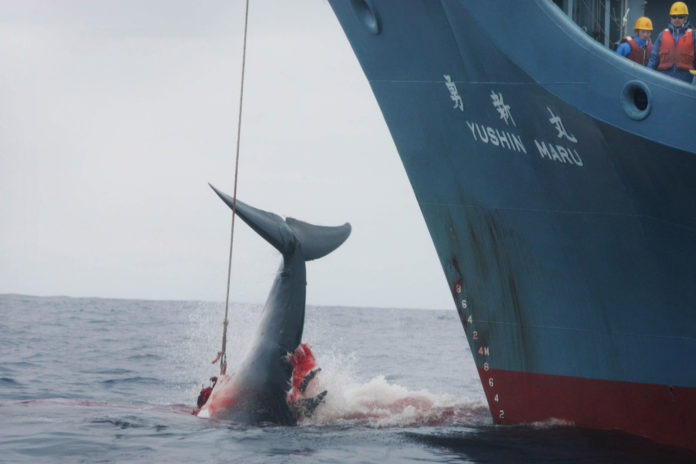A fleet of Japanese whaling ships returned home with more than 300 whales from its Antarctic hunt.
The five-ship fleet had set out for the Southern Ocean in November, with the goal of slaughtering 333 minke whales, despite objections from Australia and New Zealand. Having finished its four-month expedition, the fleet arrived at Shimonoseki port in western Japan on Friday, said the Fisheries Agency.
According to a press release, the Fisheries Agency described the mission as “research for the purpose of studying the ecological system in the Antarctic Sea”.
“The purpose of this research is to carry out a detailed calculation of the catch limit of minke whales and study the structure and dynamics of the ecological system in the Antarctic Ocean,” it said.
More than 200 people gathered at the port for a ceremony in front of the fleet’s main ship, the Nisshin Maru, to welcome the returning fleet.
“It was great that we have achieved our plan. We will steadily continue our research toward a resumption of commercial whaling,” said Fisheries Agency official Shigeto Hase at the welcome ceremony in Shimonoseki.
While the agency says that the hunt was for ecological research, environmentalists and the International Court of Justice (ICJ) say that the real purpose of the program is commercial whaling, to hunt whales for meat.
Whale hunting is prevalent in Japan for centuries, with whale meat consumed as a source of protein. However, domestic demand for whale meat has declined dramatically in recent times.
Under the International Whaling Commission (IWC), there is an international ban on commercial whaling since 1986, with an exception for whaling conducted for ecological research. This allowance for scientific research whaling has enabled Japan to conduct its whaling program.
In response to the ICJ ruling in 2014, Japan had called off whale hunting for a year, resuming the practice under a new document submitted to the IWC, with a plan to catch 4,000 minke whales over 12 years as a part of the research program.
The Humane Society International, an animal protection organisation, has called for an end to whaling of any kind. “Each year that Japan persists with its discredited scientific whaling is another year where these wonderful animals are needlessly sacrificed,” said Kitty Block, vice-president of the Humane Society International.
“It is an obscene cruelty in the name of science that must end,” she said.




























